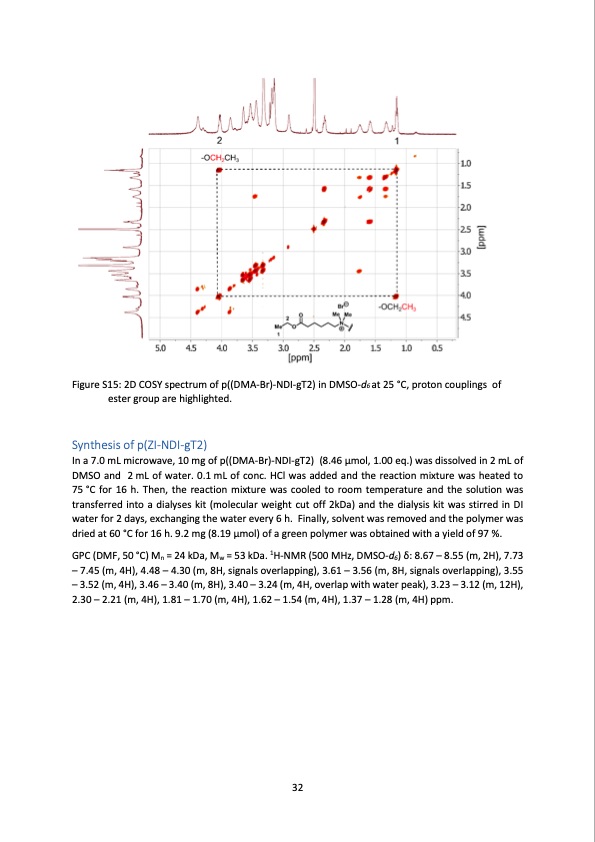
PDF Publication Title:
Text from PDF Page: 032
Figure S15: 2D COSY spectrum of p((DMA-Br)-NDI-gT2) in DMSO-d6 at 25 °C, proton couplings of ester group are highlighted. Synthesis of p(ZI-NDI-gT2) In a 7.0 mL microwave, 10 mg of p((DMA-Br)-NDI-gT2) (8.46 μmol, 1.00 eq.) was dissolved in 2 mL of DMSO and 2 mL of water. 0.1 mL of conc. HCl was added and the reaction mixture was heated to 75 °C for 16 h. Then, the reaction mixture was cooled to room temperature and the solution was transferred into a dialyses kit (molecular weight cut off 2kDa) and the dialysis kit was stirred in DI water for 2 days, exchanging the water every 6 h. Finally, solvent was removed and the polymer was dried at 60 °C for 16 h. 9.2 mg (8.19 μmol) of a green polymer was obtained with a yield of 97 %. GPC (DMF, 50 °C) Mn = 24 kDa, Mw = 53 kDa. 1H-NMR (500 MHz, DMSO-d6) δ: 8.67 – 8.55 (m, 2H), 7.73 – 7.45 (m, 4H), 4.48 – 4.30 (m, 8H, signals overlapping), 3.61 – 3.56 (m, 8H, signals overlapping), 3.55 – 3.52 (m, 4H), 3.46 – 3.40 (m, 8H), 3.40 – 3.24 (m, 4H, overlap with water peak), 3.23 – 3.12 (m, 12H), 2.30 – 2.21 (m, 4H), 1.81 – 1.70 (m, 4H), 1.62 – 1.54 (m, 4H), 1.37 – 1.28 (m, 4H) ppm. 32PDF Image | salt water battery with high stability

PDF Search Title:
salt water battery with high stabilityOriginal File Name Searched:
salt-water-battery.pdfDIY PDF Search: Google It | Yahoo | Bing
Product and Development Focus for Salgenx
Redox Flow Battery Technology: With the advent of the new USA tax credits for producing and selling batteries ($35/kW) we are focussing on a simple flow battery using shipping containers as the modular electrolyte storage units with tax credits up to $140,000 per system. Our main focus is on the salt battery. This battery can be used for both thermal and electrical storage applications. We call it the Cogeneration Battery or Cogen Battery. One project is converting salt (brine) based water conditioners to simultaneously produce power. In addition, there are many opportunities to extract Lithium from brine (salt lakes, groundwater, and producer water).Salt water or brine are huge sources for lithium. Most of the worlds lithium is acquired from a brine source. It's even in seawater in a low concentration. Brine is also a byproduct of huge powerplants, which can now use that as an electrolyte and a huge flow battery (which allows storage at the source).We welcome any business and equipment inquiries, as well as licensing our flow battery manufacturing.| CONTACT TEL: 608-238-6001 Email: greg@salgenx.com | RSS | AMP |